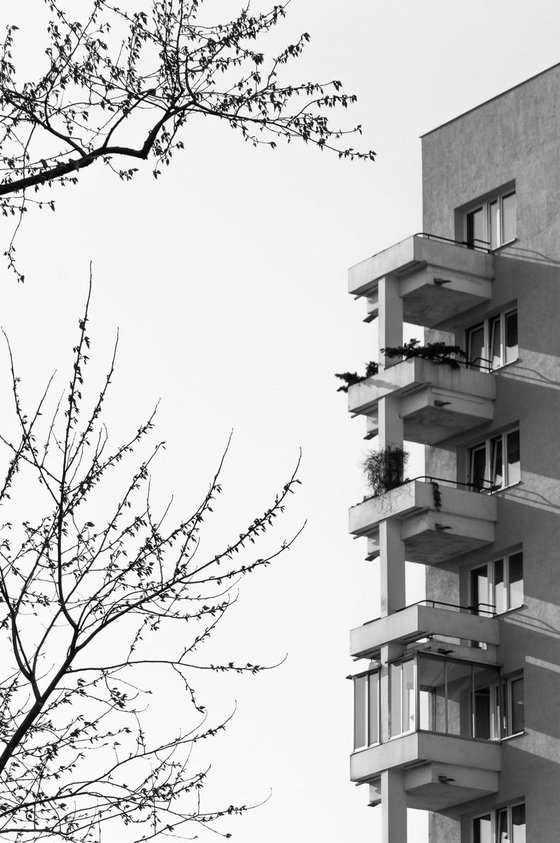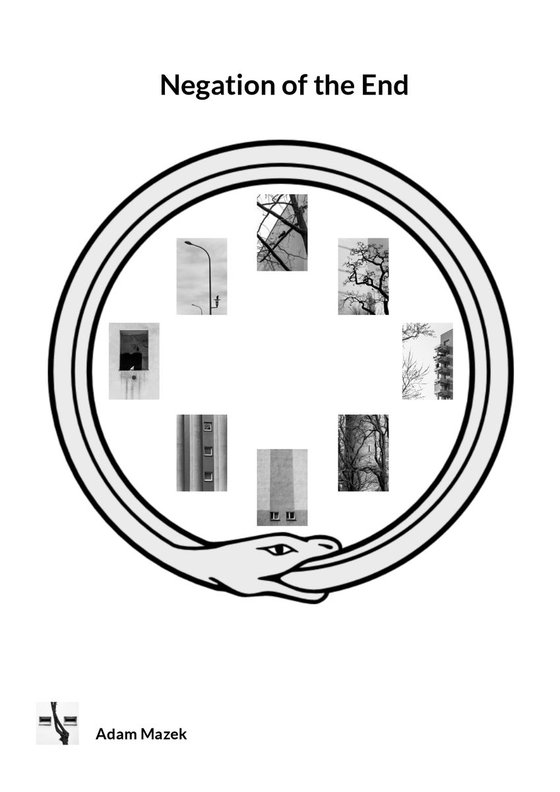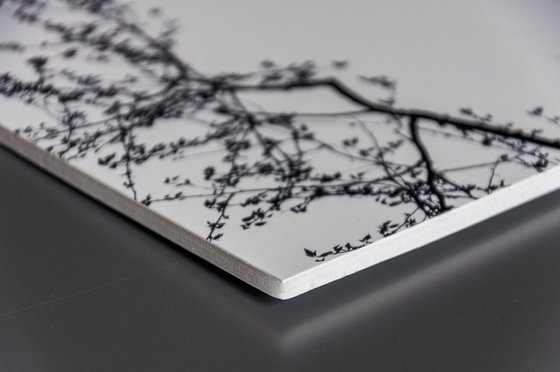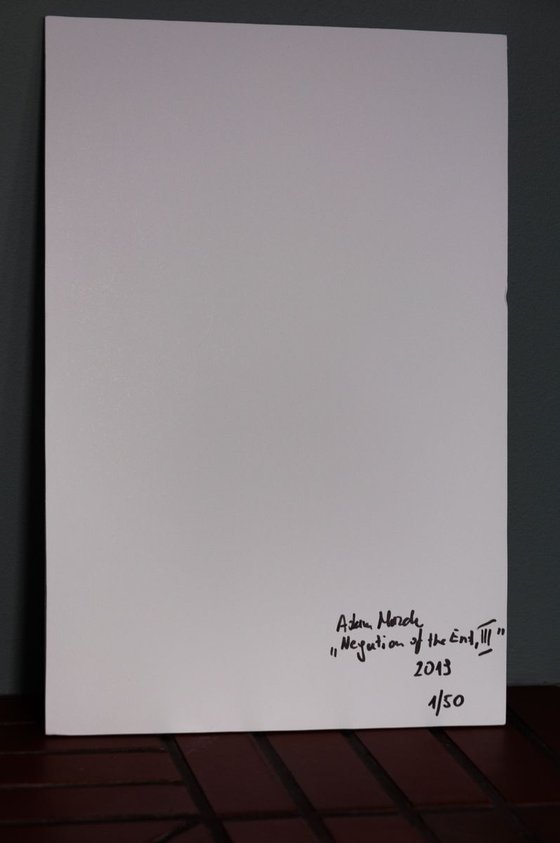- By medium
- By subject
- By budget
- Sales
- Gift cards
- Discover all art
- Artists
- Editors’ picks
- Ideas
Artwork description:
Picture "Negation of the End, III" is one of the elements of the artwork made by Adam Mazek, named "Negation of the End."
Everything in this oeuvre has its logical order. “Negation of the End” masterpiece is a delicate and subtle reference to the works of such people as James Joyce, Hiroshige, and Charles Sheeler. Also, it is a tribute to all the past, contemporary and future humans, who started to use Art as a tool to self-expressing oneself.
The artwork, in total, consists of eight images. If placed in order, they can create tremendous, visual, neverending Work. Its structure is similar to the composition of James Joyce’s work of fiction “Finnegans Wake.” It's circular, cryptically infinite construction creates an astonishing reference to the ancient Egyptian’s symbol of life and death – Ouroboros (please, see attached file with graphic). Pictures presented in “Negation of the End” work also refer to the death and resurrection. Bringing together the beginning and end of the photographs presented in this artwork, with a constant passage between three motifs (trees – windows – birds), artwork’s structure reminds the Ouroboros – a serpent eating its tail. One topic disappears, suddenly the second appears, then the third one, to return to the first motif again.
Like an ancient Egyptian symbol, the artwork does not possess de facto its beginning and end.
The snake is the cosmic spirit. It brings everything to life and also kills everything. Ouroboros is everything, and also nothing. Its everywhere and simultaneously he is nowhere. Indeed, there is no end and the beginning. Everything, even our life, and death is a part of the mystical Universe. All beings and the whole Cosmos are the part of the continuous circulation of divine work. “Negation of the End” possesses its own integral, neverending flow.
Like I already mentioned Adam Mazek’s collection of photographs possess three central motifs: trees, windows, and birds.
Regarding, the trees, Japanese artist Hiroshige is the one who inspired me to create this work. Vertical, full of curly, specific branches of trees is the motif which we can often see in Artworks of a famous Japanese master. The tree can show us how, from a tiny, individual seed, the self can come into existence. The tree is also the symbol of being born again.
We have left the bodies of our ancestors in wood coffins. In most of the religions, these bodies are waiting for rebirth. The tree signifies the resurgence. For alchemists, the tree represents not only a place of awakening to a new life but also the suffering. Suicides and executions were done in the woods throughout the history of the humankind. The tree is a symbol of the eternal circulation of divine Work. As we can see, the trees can also symbolize the negation of the end.
*Please, take a notice that the graphic is not for sale. For sale is only photograph "Negation of the End, III."
Materials used:
Photography is on the foam board.
Tags:
#black and #birds #trees #minimalism #vertical #street photography #windows #hiroshige #james joyce #prehistoryNegation of the End, III (2018) Photograph
by Adam Mazek
2 Artist Reviews
Now £75.57 £151.13
50% off sale. Sale ends in 11 days 17 hours
- Photograph on Paper on board
- From a limited edition of 2
- Size: 30 x 45 x 0.5cm (unframed) / 30 x 45cm (actual image size)
- Ready to hang
- Signed and numbered on the back
- Style: Photorealistic
- Subject: Flowers and plants
- Hurry only 1 left in stock
Loading
Artwork description
Picture "Negation of the End, III" is one of the elements of the artwork made by Adam Mazek, named "Negation of the End."
Everything in this oeuvre has its logical order. “Negation of the End” masterpiece is a delicate and subtle reference to the works of such people as James Joyce, Hiroshige, and Charles Sheeler. Also, it is a tribute to all the past, contemporary and future humans, who started to use Art as a tool to self-expressing oneself.
The artwork, in total, consists of eight images. If placed in order, they can create tremendous, visual, neverending Work. Its structure is similar to the composition of James Joyce’s work of fiction “Finnegans Wake.” It's circular, cryptically infinite construction creates an astonishing reference to the ancient Egyptian’s symbol of life and death – Ouroboros (please, see attached file with graphic). Pictures presented in “Negation of the End” work also refer to the death and resurrection. Bringing together the beginning and end of the photographs presented in this artwork, with a constant passage between three motifs (trees – windows – birds), artwork’s structure reminds the Ouroboros – a serpent eating its tail. One topic disappears, suddenly the second appears, then the third one, to return to the first motif again.
Like an ancient Egyptian symbol, the artwork does not possess de facto its beginning and end.
The snake is the cosmic spirit. It brings everything to life and also kills everything. Ouroboros is everything, and also nothing. Its everywhere and simultaneously he is nowhere. Indeed, there is no end and the beginning. Everything, even our life, and death is a part of the mystical Universe. All beings and the whole Cosmos are the part of the continuous circulation of divine work. “Negation of the End” possesses its own integral, neverending flow.
Like I already mentioned Adam Mazek’s collection of photographs possess three central motifs: trees, windows, and birds.
Regarding, the trees, Japanese artist Hiroshige is the one who inspired me to create this work. Vertical, full of curly, specific branches of trees is the motif which we can often see in Artworks of a famous Japanese master. The tree can show us how, from a tiny, individual seed, the self can come into existence. The tree is also the symbol of being born again.
We have left the bodies of our ancestors in wood coffins. In most of the religions, these bodies are waiting for rebirth. The tree signifies the resurgence. For alchemists, the tree represents not only a place of awakening to a new life but also the suffering. Suicides and executions were done in the woods throughout the history of the humankind. The tree is a symbol of the eternal circulation of divine Work. As we can see, the trees can also symbolize the negation of the end.
*Please, take a notice that the graphic is not for sale. For sale is only photograph "Negation of the End, III."
Materials used:
Photography is on the foam board.
Tags:
#black and #birds #trees #minimalism #vertical #street photography #windows #hiroshige #james joyce #prehistory14 day money back guaranteeLearn more





